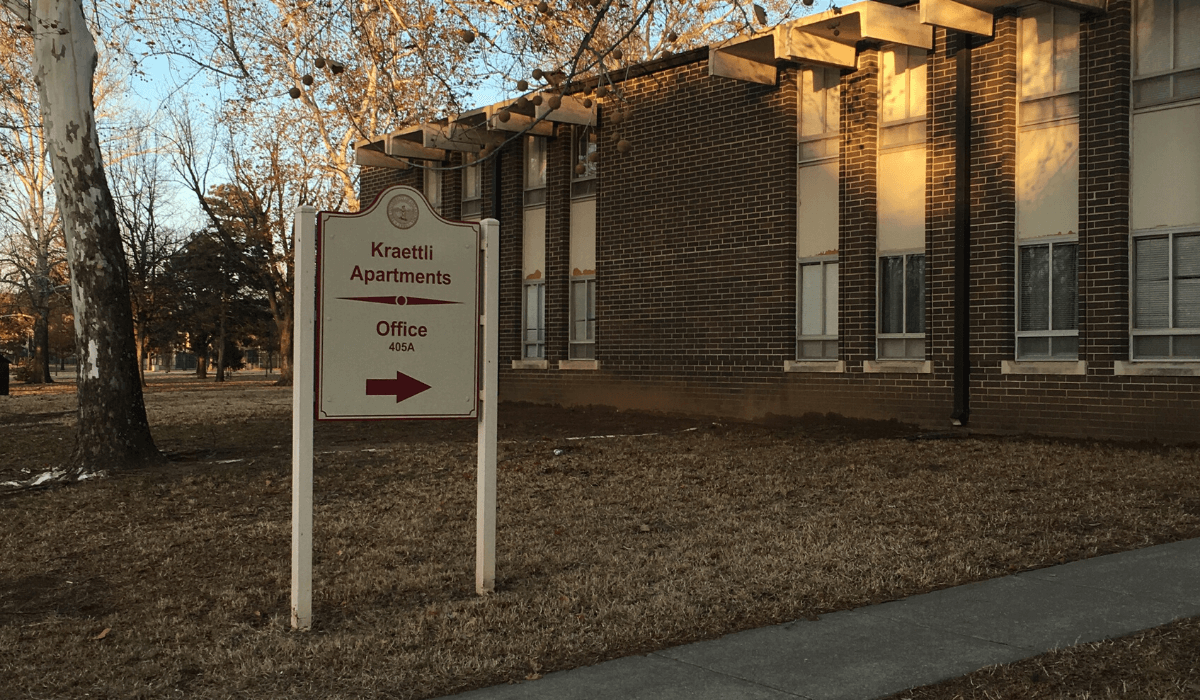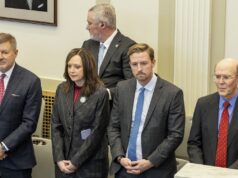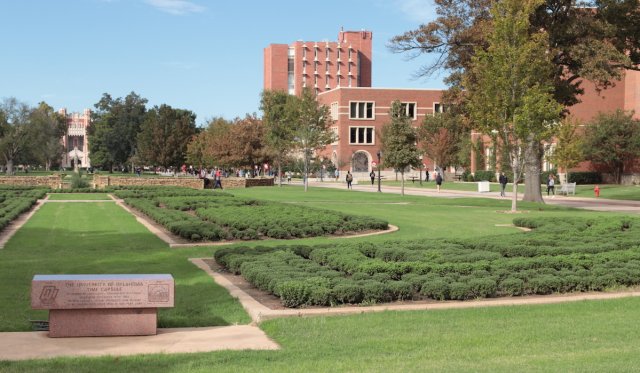

Youssef Kamel and Miguel Marin grew up on different continents, but through fate and tough decisions, they found themselves spending perhaps their most formative years at the University of Oklahoma.
Kamel grew up in Giza, Egypt, where he could see the legendary pyramids from his backyard. Marin grew up in Colombia, a South American nation stigmatized for drug kingpins but that has recently become a hot destination for American tourists.
Both came to the United States looking for the same thing: a place to get an education and, in turn, better their prospects for the rest of their lives.
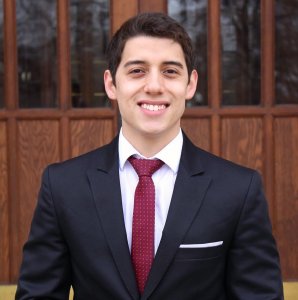
“For me, it was an opportunity,” Marin said. “OU had the Boomer-Sooner culture. They had the scholarship offer and the resources that would help me get a very good education.”
Kamel arrived in the United States with similar hopes. He came to OU via the United Kingdom where he spent his high school years at a boarding school.
“I was as excited as any other college student when they know they would be getting a scholarship to go to university,” he said. “These are opportunities you work for and are happy to have.”
But scholarships or not, fewer international students are choosing American universities to further their educations. Since 2015, new international student enrollment at American colleges has dropped by 10 percent, according to a study by the Institute of International Education.
International student enrollment falling at Oklahoma universities
Mirroring the national trend, international student enrollments at the University of Oklahoma and Oklahoma State University have also declined over the same period, according to data provided by the two schools.
In the fall of 2015, OU had 2,041 international students enrolled. That number dropped by nine for the fall 2016 semester.
But over the last two years, that pace has accelerated. By fall 2017, only 1,983 students were enrolled. That dropped to 1,844 a year later and fell to 1,701 when the current academic year began in August. Overall, OU’s international student enrollment has dropped 16.6 percent since fall 2015.
That mirrors a similar trend at OSU. In fall 2015, the university had 1,998 international students enrolled. That fell by 16 students the following year. In fall 2017, it dipped to 1,813.
At the beginning of this academic year, OSU had only 1,596 international students, a 20.1 percent drop since fall 2015.
Causes behind the international student enrollment trend
When it comes to why fewer international students are coming to the United States for their higher educations, university officials in Oklahoma cite a number of factors.
An increase in economic opportunities at home appears to be part of the trend. In China, per-capita income has been on a steady rise since 1990. In India, that trend has been in play for even longer.
“We still get quite a few applications from China and India, but I definitely think some of the domestic changes in the economy in those places have had some kind of impact on the shifting preferences,” said Randall Hewes, dean of OU’s Graduate College.
But drilling down to the “why” is more difficult than it sounds. When OU recruits international students who decide not to choose Norman, they rarely elaborate on their decision.
“It’s hard to pinpoint that,” OU director of admissions Jeff Blahnik said. “We don’t have good data on what those decisions are about.”
But one issue many international students confront when deciding whether to pursue a U.S. education involves personal safety.
The United States is ranked No. 1 among developed nations in firearm homicides with 29.7 per 1 million people, according to data from the United Nations.
The country fares better on overall violent crime, with per-capita rates lower than the United Kingdom and France. But the U.S. remains No. 1 in homicides among developed nations, with 5.1 homicides per 100,000 people.
“General safety of the student is one concern we hear fairly frequently,” Blahnik said. “It’s a big commitment to send your child abroad. That’s something that has to be carefully considered.”
While Norman has seen a slight uptick in violent crime in recent years, OU’s campus is among the safest in the nation, according to some rankings.
“OU is considered to be a very safe campus, and those that are able to come here before they decide to attend, the families feel safe here. But personal safety is the number one thing we hear about,” Blahnik said. “Visa issues are the other most common concern. It’s just not as easy to get the needed visas here as it is in the United Kingdom, Australia or Canada.”
In those countries, enrollment has been trending upward. Canada’s international student enrollment has been increasing by double digits each year. Enrollment in Australian colleges is up nearly 50 percent since 2015, the same year the decline began in the United States.
OU’s pitch to international students is part big-school-powerhouse and part liberal-arts campus with a family feel, and for the past two years the university has not increased tuition.
“I think one of the things we stress for international students, but also for United States nationals, is that we’re a sizable university, but we have a small-college, liberal-arts feel,” Hewes said.
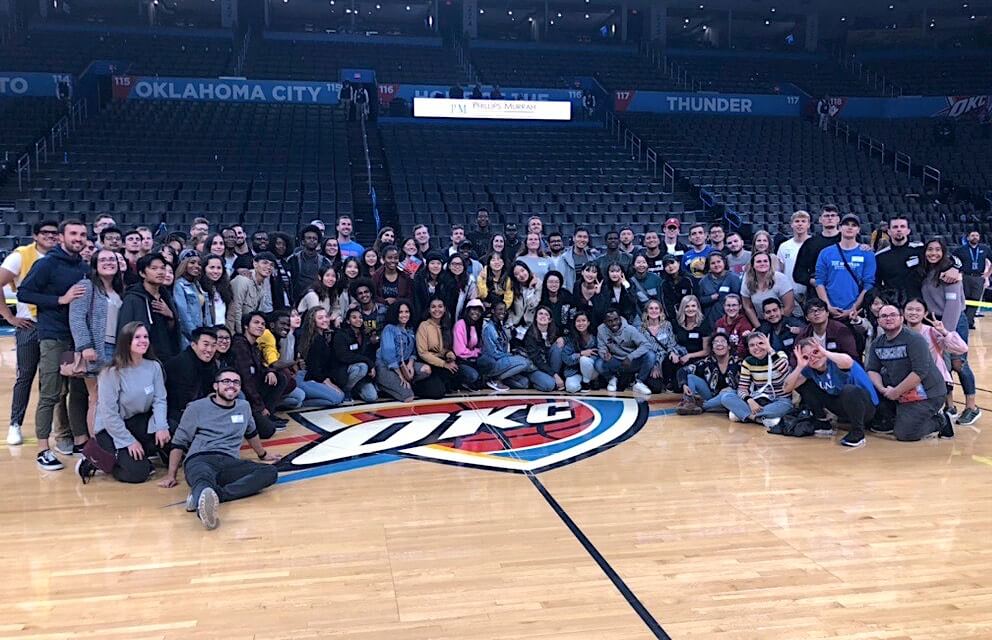
Political rhetoric has an impact
As Youssef Kamel was finalizing his plans to come to the University of Oklahoma, he watched the 2016 presidential campaign from the United Kingdom where he had been attending school for several years.
“It wasn’t really that scary to me,” he said. “I followed most of the campaigns: Clinton and Sanders and Trump. It seemed like everyone was paying the most attention to Trump because he was so different from the other candidates. I was following those campaigns, but at the time it wasn’t really something that would prevent me from coming to the United States. At that time, most people thought Clinton would win.”
Kamel admits he didn’t fully understand the power of the office.
“The presidency was a huge thing, and I don’t think a lot of us thought it could affect us until a little later,” Kamel said. “That doesn’t just go for international students, but also for people of color. I don’t think any of us foresaw how it would play out.”
When it comes to why fewer international students are studying in the United States, Kamel believes the Trump administration’s immigration policies have had a big effect.
“What I consider the largest reason is the Trump administration and his travel ban,” Kamel said. “Nobody really considered that to be a serious matter because he hadn’t been elected yet. Even if he was saying what his plans were to get voters, a lot of people didn’t think he would actually act on those promises. Then the travel ban happened and a lot of people found it harder to come here.”
That threat hit home in February 2019. At that time, 18 international students at OU were facing deportation because of holds on their bursar accounts. If they were unable to pay, they would not be able to enroll, meaning they would lose their F1 student visa and be required to leave the country.
“He had a policy change that affected a lot of people,” Kamel said of the president. “They were at risk of losing their visas and legal status. The response to those concerns wasn’t very good. And there were a lot of comments that came after that were harsh — that we were only here to come steal money and leave.”
‘I have a higher probability of dying here than in my own country’
Miguel Marin knows what most people think when they hear he is from Colombia.
“Pablo Escobar,” he said. “But that was a different time. It was in the ’80s. It’s a different place now. I have a higher probability of dying here than in my own country.”
Growing up in Colombia, Marin never really thought much about gun violence. And while he marvels at the difference in culture of each of America’s 50 states, he doesn’t understand the fascination with guns.
“You have a police system that is very well-respected,” he said. “I don’t understand the need to carry guns. I don’t always feel safe because of that. I am always thinking of my safety, and what’s interesting to me is there are a lot of American students who think that way, too. It’s unfortunate.”
Egypt has seen its share of violence over the last decade, but Kamel’s American college experience also came with a fair amount of shock.
“I definitely had an idea about the violence before I came here,” Kamel said. “But I didn’t realize how many shootings there were until I came here and started getting notifications of news events happening in real-time on my phone. It’s a huge issue. It’s very foreign for a lot of people to treat guns in such a way. In Egypt, guns are kind of taboo. You don’t have one unless you are a cop or ex-military.”
The news of shootings and unrestrictive gun policies in many American states isn’t lost on those who take the time to study the country they might be studying in. Marin believes it has an effect.
“It has disincentivized a lot of kids from other countries from coming,” he said.
Broadening perspectives
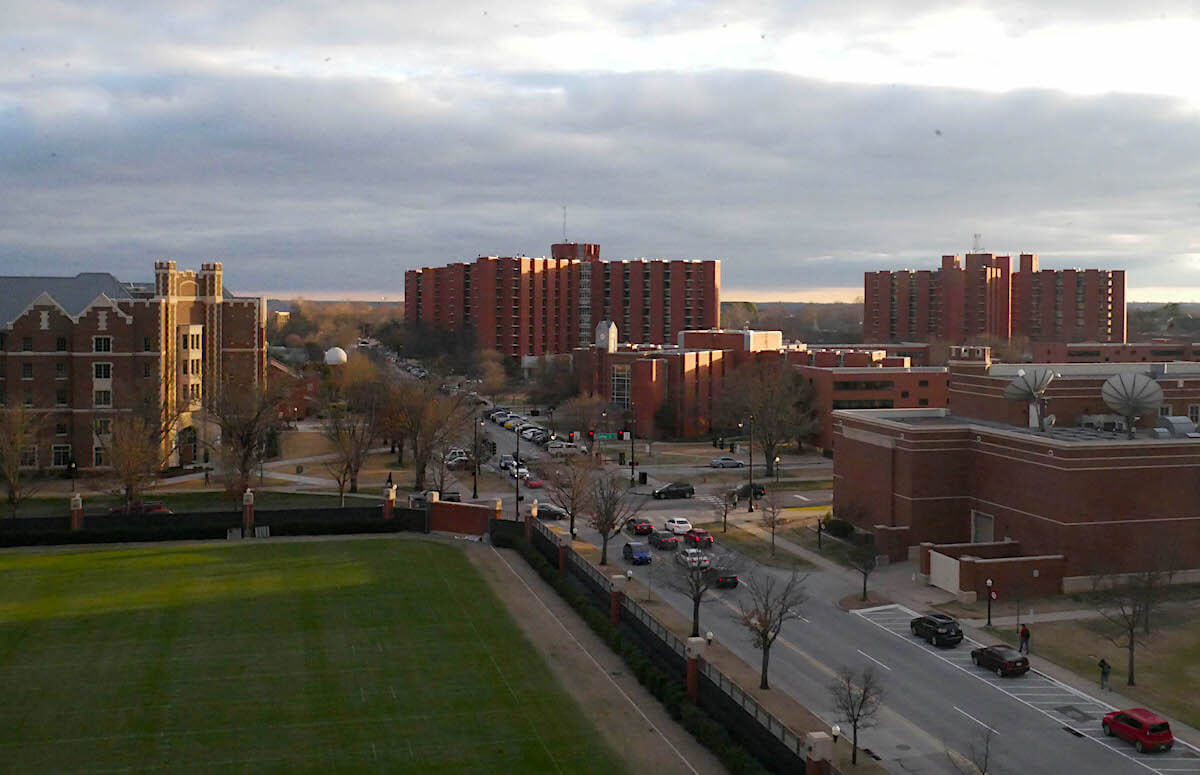
International students make up about 6.5 percent of OU’s student population. While offering international students scholarships might be objectionable to some, officials believe they add value to the university, both to the student body and to the university’s goal of developing graduates equipped to make an impact in a global economy.
“One of the goals we have for our students — if you think about the three big goals — when I think about sending my own kid to college, you want them to have a great academic experience and develop a world view,” OU interim president Joseph Harroz said in December. “And I think about how enriching it is to have international students in the university community and what they add for all students when you get to learn about a different culture from the lens of someone who lived there.”
Hewes, OU’s graduate college dean, has taught an array of biology classes. He said he has enjoyed getting to know students from other countries. While he’s a well-credentialed academic, Hewes said he feels like he learns something from the experience.
“I think it’s one of the things that makes this career engaging and fun,” he said. “You learn a lot from your students. The more students you bring in from diverse backgrounds, the more you learn. I’ve had a great experience getting to know international students.”
Room for improvement
When Marin talks about his future possibilities, the excitement in his voice is palpable. He dreams of becoming an entrepreneur and creating jobs.
While he would love to do that here, he believes it may not be possible. When he finishes his degree at the Price College of Business, his travels will likely take him elsewhere. And while he enjoys much of the American culture he has experienced, he wonders if Americans could be more engaged with the rest of the world.
RELATED
‘We have a community here’ at OU’s Kraettli Apartments by Trinity Cohee
“The whole world is moving toward an open, more-collaborative mindset where we create opportunities for business while also protecting the environment,” he said. “But it seems like America is going backwards. It’s interesting to look at on a political level.”
Kamel said he wishes more would be done to support international students. While they can hold jobs on campus, most international students are prohibited from getting off-campus jobs at the risk of losing their visa. Those jobs are sometimes hard to find. He cited the abrupt decision to close Cate Restaurants on OU’s campus in May 2018 that left many scrambling for work. (The restaurant has since reopened.)
“There is room for improvement while also prefacing that with there is a strong community of international students and advocates at OU,” he said. “But in terms of other things, I think there is a very implicit bias. A lot of places aren’t designed for international students. Not that I would expect it to be, but I think some things could be better.”
Kamel said those charged with helping international students navigate the myriad of issues are helpful and committed to making things go as smoothly as possible, but he said they are often understaffed. He cited health care as another example of something that could be improved. Goddard Health Center is the sole provider of primary health services for international students.
“I don’t have the money to go anywhere else,” he said. “There really is no second option for a lot of students, including American students who don’t have other options either. This is horrible for everyone. But it hits international students especially hard.”
Marin said OU and the rest of the country should be more inclusive. Racial controversy stirred on the Norman campus again in February when journalism professor Peter Gade equated the phrase “Okay, boomer” to a racial slur during a classroom discussion. The incident made national news, and it was the latest in a string of problematic incidents on campus.
“Increasing the diversity — but also inclusivity — is something that needs to be done,” Marin said. “This is something that can’t be done in a day, but diversity needs to be seen as a strength.”
College experience ‘has been totally worthwhile’
No college experience is without problems. Bad grades, money and personal relationships can combine to create plenty of turbulence for young adults.
And for international students, those issues can be magnified and made even more stressful. But despite those challenges, Marin will take plenty of positives away from his OU experience, along with his degree.
“It has been totally worthwhile,” he said. “I’m very grateful to have been here. I’m very humbled by the experience. These last three years have been crucial to my personal and professional development. I’ve met so many role models and mentors and have increased my network and made a lot of friends. There are so many good things to look back on.”
Kamel said while the experience at OU has been challenging, he came away a better person.
“I would like to think on a personal level it has helped me grow because it’s put me in a lot of different situations, and those are good as far as personal development,” he said. “I’m also thankful for those who have helped me along the way. There are so many allies in and out of international studies, and they are a big reason why people keep going.”









